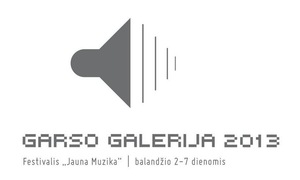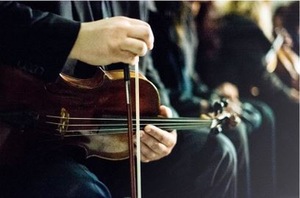PLEASURES OF LISTENING IN THE FESTIVAL JAUNA MUZIKA OF THIS YEAR 4
In brief: The annual festival Jauna Muzika dedicated to contemporary music took place in Vilnius on April 2–7. From the very beginning of its existence, when the festival had a subheading “e-music”, its biggest part was dedicated to electronic music. This tendency remains until now with some exceptions. The subheading was changed to the more abstract “sound gallery” several years ago. Jauna Muzika also presents a wide spectrum of contemporary academic music – it is very natural for an event organised by the Composers’ Union.
The theme of the festival of this year was text (and its various forms and meanings). The biggest number of concerts of the festival was organised in the new film hall of the Contemporary Art Centre.
The festival started with the concert of the festival curator, composer Antanas Jasenka and cellist Anton Lukoszevieze, during which compositions created by each of them and the music piece of the sound artist Zbigniew Karkowski resounded.
The second concert of the festival was dedicated to works of Lithuanian authors (with one exception – the show of the guest from Austria Burkhard Stangl). The author of the article states that if he had to elect a music piece for an imagined Oscar or Golden Lion nomination of Jauna Muzika of this year, the author’s choice would be “My ABC” by Arturas Bumšteinas (2013). It is an electro-acoustic composition of 4 channels created from the author’s voice recordings processed using various audio montage methods.
The third evening of the festival was dedicated to the famous Italian composer, classic of music of the 20th century Luciano Berio. The concert was initiated and organised by the Lithuanian Ensemble Network headed by the composer Vykintas Baltakas.
Another unique concert of the festival that attracted the biggest number of listeners took place at St. Casimir Church. It was the project Ambientorg of the composers Lukrecija Petkutė, Mykolas Natalevičius and Tadas Dailyda. Its idea was not usual – famous electronic music compositions were adapted for the organ and were performed in churches.
The last event of the festival programme – the competition of electronic and computer music pieces was organised by Jauna Muzika along with the LMTA Music Innovation Studies Centre. Students and lecturers could present their works for the competition. The event was full of attractions and the voting mechanism reminded of Eurovision contest in some way.
In general, it is possible to state that Jauna Muzika of this year was interesting and did not differ from earlier events from this point of view. True, there were fewer presentations of tendencies of international experimental music and figures that are in the epicentre of the scene. Due to this reason the festival was more local and chamber this year.


